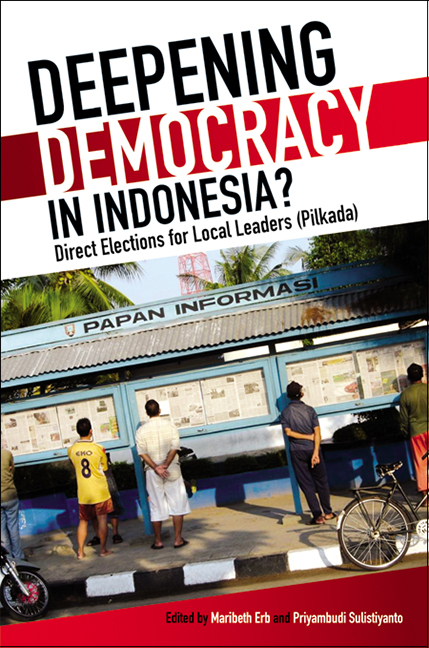Book contents
- Frontmatter
- Dedication
- Contents
- List of Tables
- List of Figures
- Contributors
- Acknowledgements
- Glossary
- 1 Indonesia and the Quest for “Democracy”
- 2 Pilkada Langsung: The First Step on the Long Road to a Dualistic Provincial and District Government
- Part I Political Parties, Politician Elites and the Voters
- Part II Media and Campaigns: Comparing Local and National Elections
- Part III Conflict, Ethnicity, and Political Divisions
- 12 Autonomy, Democracy, and Internal Conflict: The 2006 Gubernatorial Elections in Papua
- 13 Conflict and the Growth of Democracy in Manggarai District
- 14 The Return of the Sultan? Patronage, Power, and Political Machines in “Post”-Conflict North Maluku
- 15 Ethnic Politics and the Rise of the Dayak-Bureaucrats in Local Elections: Pilkada in Six Kabupaten in West Kalimantan
- 16 Bare-Chested Politics in Central Sulawesi: Local Elections in a Post-Conflict Region
- Index
13 - Conflict and the Growth of Democracy in Manggarai District
from Part III - Conflict, Ethnicity, and Political Divisions
Published online by Cambridge University Press: 21 October 2015
- Frontmatter
- Dedication
- Contents
- List of Tables
- List of Figures
- Contributors
- Acknowledgements
- Glossary
- 1 Indonesia and the Quest for “Democracy”
- 2 Pilkada Langsung: The First Step on the Long Road to a Dualistic Provincial and District Government
- Part I Political Parties, Politician Elites and the Voters
- Part II Media and Campaigns: Comparing Local and National Elections
- Part III Conflict, Ethnicity, and Political Divisions
- 12 Autonomy, Democracy, and Internal Conflict: The 2006 Gubernatorial Elections in Papua
- 13 Conflict and the Growth of Democracy in Manggarai District
- 14 The Return of the Sultan? Patronage, Power, and Political Machines in “Post”-Conflict North Maluku
- 15 Ethnic Politics and the Rise of the Dayak-Bureaucrats in Local Elections: Pilkada in Six Kabupaten in West Kalimantan
- 16 Bare-Chested Politics in Central Sulawesi: Local Elections in a Post-Conflict Region
- Index
Summary
“The essence of democracy is that the process itself is more important than the outcome of any single poll”, Leigh 2005, p. 23.
On 12 April 2006 the National Court (Pengadilan Negeri) in the town of Ruteng, capital of Manggarai district, awarded a settlement of over 2 billion rupiah to two pairs of contestants from the 2005 electoral race for regent: Anton Bagul Dagur, who had been the incumbent, and his running mate, Pius Kandar, and Gabriel Thody Wajong and his running mate, Wilhelmus Nanggur. Their claim was that the results of the Manggarai local election for regent (pilkada), were invalid because the election process had been plagued with numerous irregularities; they made their claims both against the KPUD (the Local Electoral Commission), and the winning pair, Christian Rotok and Kamelus Deno, popularly referred to by the acronym “Credo”, a very appealing appellation in the predominantly Catholic district. Although the district-level court awarded these damages, the provincial-level court (“The High Court” — Pengadilan Tinggi), had earlier, in July 2005, dismissed any claims of electoral irregularities. Thus the inauguration of the new regent had taken place in mid-2005. The losing candidates and several civil society organizations had continued to dispute the results, however, and had finally won a positive judgement in regard to their accusations from the local court. This case in Manggarai was one of many examples of accusations of irregularities in the local electoral process across Indonesia, inaugurated in June 2005, when a large percentage of these first district head elections were held (see Pratikno, Chapter 3, this volume). What we find particularly interesting about the Manggaraian election, and the objections over the results that continued for at least a year after the installation of the new head, was that the civil society organizations that disputed the election results along with the incumbent regent from the 1999–2004 period, were the same groups who had been fiercely opposed to that same incumbent when he was in office. What we will argue, then, is that the situation in Manggarai is an interesting case of conflicting ideas about the meaning of democracy, and the role of the electoral process in its growth and consolidation. We suggest that the Manggarai election calls into question what the meaning of “free and fair” actually is in the context of an election.
- Type
- Chapter
- Information
- Deepening Democracy in Indonesia?Direct Elections for Local Leaders (Pilkada), pp. 283 - 302Publisher: ISEAS–Yusof Ishak InstitutePrint publication year: 2009



